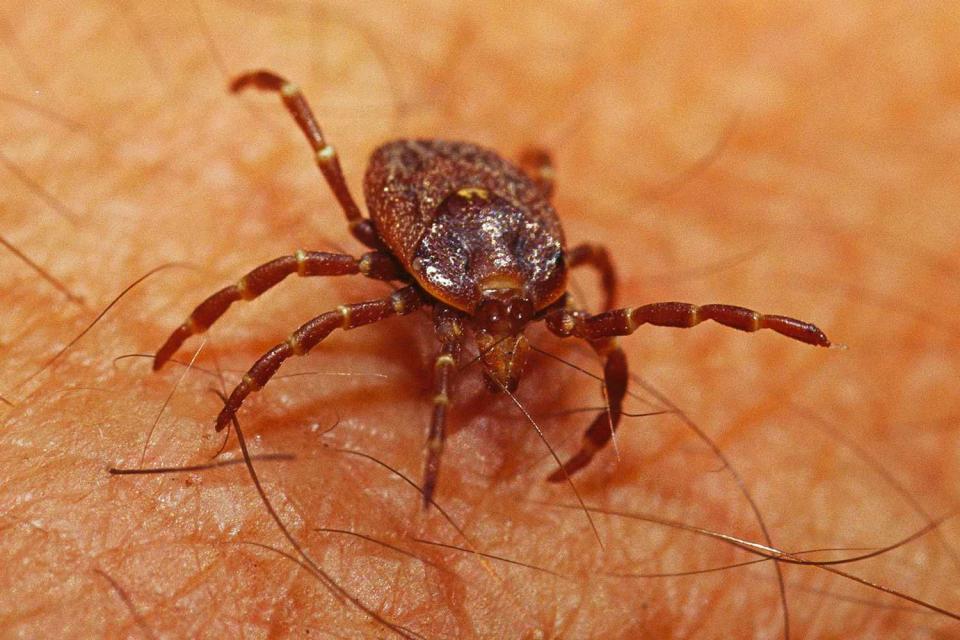Meat Allergy Caused by Tick Bites Is Becoming More Common, Nearly 450,000 People Could Be Affected, Says CDC
The once-rare alpha-gal syndrome is threatening more lives due to longer tick seasons caused by climate change

Getty Images
Once rare, a meat allergy caused by tick bites known as alpha-gal syndrome is affecting more people, according to the CDC.
More than 110,000 Americans have developed an allergy to red meat due to a tick bite since 2010, but thousands more could be undiagnosed, according to new studies released by the Centers for Disease Control and Prevention on Thursday.
The government agency estimates the number of Americans experiencing the allergy could be as high as 450,000, which would make it the 10th most common food allergy in the country, per the Associated Press.
The CDC found that there is a lack of information about the allergy, its causes and its symptoms. Per the second report, 78% of the 1,500 health care providers surveyed had little to no knowledge of the syndrome, and nearly 50% those who did know of AGS reported they were unsure of the proper tests to order to diagnose it.
The data also found that 42% of the doctors, nurse practitioners and physician assistants who responded were not aware of AGS, and another 35% were not confident in their ability to diagnose or manage AGS patients.
Related: Red Meat Allergies Caused by Lone Star Tick Bites Are Increasing Across the U.S.
Alpha-gal syndrome can be triggered by a tick that carries the sugar molecule alpha-gal in its saliva — a molecule found in beef, pork, lamb and the meat of most mammals. The researchers found that the reaction is primarily associated with the bite of the lone star tick, and the region of the tick (southern, midwestern, and mid-Atlantic states) overlaps with the geographic distribution of known and suspected cases.
The authors of the study called the knowledge gap they discovered “concerning” when looking at the continued increase in antibody test results that were positive for the syndrome, the rising number of suspected cases and the growing reach of the lone star tick. Tick season is also longer than it has been in the past, due to warmer temperatures.
“AGS is not a nationally notifiable condition, and understanding epidemiologic trends relies on laboratory-based surveillance,” the authors wrote in the study. “The lack of HCP knowledge of AGS is likely to lead to undertesting, further hampering knowledge of the national prevalence of AGS.”
The symptoms of AGS can range from mild, with patients experiencing gastrointestinal problems, to severe, with some experiencing anaphylaxis.
Katie Cahoj, a 30-year-old elementary school teacher from Pomona, Missouri, is one of the many people coming to terms with an alpha-gal diagnosis. Following a harrowing experience with near-fatal anaphylactic shock after eating a breakfast sandwich with cheese and sausage, an allergy test revealed she could no longer eat meat or any products containing animal additives.

Cheyenne McIntosh
Katie Cahoj, who has alpha-gal syndrome, at home in Missouri in 2023.“I had to read every single label,” she told PEOPLE. “I was afraid to eat anything."
She lost 30 lbs. in six months out of pure fear. “The only thing I felt safe eating was what I made,” she says, which was mostly raw vegetables and chicken. She eventually started experimenting in the kitchen and even self-published An Alpha Gal Cooks, a cookbook full of safe recipes for other people suffering from the disease.
Never miss a story — sign up for PEOPLE's free daily newsletter to stay up-to-date on the best of what PEOPLE has to offer, from juicy celebrity news to compelling human interest stories.
There is no cure for alpha-gal syndrome. Treatments may include antihistamines, steroids and epinephrine to manage symptoms, but people with the disease must avoid food triggers in the first place.
For more People news, make sure to sign up for our newsletter!
Read the original article on People.

